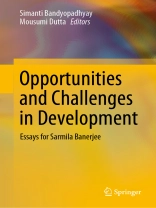This book provides a broad overview of the current research on various aspects of development, with a focus on India. The content and treatment of the subject of development in this volume is distinctive in many ways. It is a balanced mix of theory and practical elements, dealing with a number of issues at micro as well as macro levels. The analyses of the current socio-economic problems are attempted in an elegant yet simple manner which makes it equally useful for an aspiring researcher in economics or any inter disciplinary field. The methodologies of the articles include analytical verbal argumentative logic, theoretical constructs or different versions of statistical, econometric or programming techniques. It also contains well written survey articles, which are useful in grasping the fundamental research issues and in tracing the progress of research in an area. The general scope of the book is very wide as the readership can include researchers, scholars, graduate and undergraduate students, policy makers and practitioners. Though the contributors are primarily scholars in the field of Economics or Statistics, the book contains useful takeaways for those working in the area of Development. It will also be of interest to policy makers and practitioners interested in development issues, and to post graduate students in Economics or any field, in social science, management or development.
Inhaltsverzeichnis
The Limits of Neo-liberal Development Strategies.- Keynes, Working Hours and the Environment.- Rational Expectations: Its Background and Initial Applications in Macroeconomics.- Uncertain R&D Outcomes and Cooperation in R&D.- Simultaneous Estimation of Median Incomes of the American States: a Bayesian Method for Shrinkage Estimation of Multiple Subpopulation Means.-
Court efficiency and firm performance: A study on West Bengal.- Informal ‘Firm’ – Progression or Persistence? A Study of Four Natural Clusters of West Bengal.- Group Formation and Endogenous Information Collection in Microcredit.- International joint ventures in developing countries: a survey of analytical issues.-
Investment Slowdown in India: Causes and Implications.- Stock Market Boom and Economic Growth: A Theoretical and Empirical Analysis of Cause and Effect.-
On Identifying appropriate Volatility Models for India and China.-
Exchange Rate Pass-through to Sectoral Import Prices in an Emerging Market Economy: Indian Evidence.-
Vertical Fiscal Imbalances in Indian States.- Political Economy of Fiscal Reforms in Indian States.-
Tales of Two Understandings of Nature: Epistemology and Morality.-
Effect of Energy Prices on Environmental Pollution in India.-
Disaster and Informality: An Analysis of Social Conditions of Vulnerability.-
Fetching Pails of Water: Examining Households Choice of Drinking Water Sources in India.-
Trend in inter-state disparity of well-being in India in the post-Reforms period.-
Measuring Entropy-based Consumption Diversity – Welfare incidence in India.-
Handloom in West Bengal: Labour Mobility in a ‘Traditional’ Sector.-
Household Self-employment Eliminates Child Labour.-
Of Paid Domestic Services: To Care More or Less.-
Gulf War Syndrome: The Plight of War Veterans in the U.S.-
Foetal Starvation, Economic Adversity and Health: A Difference-in-difference Approach.-
Total Factor Productivity Growth of Elementary Education in India and its Determinants.
Über den Autor
Simanti Bandyopadhyay is currently Associate Professor, Economics and Public Policy Area, School of Management and Entrepreneurship, Shiv Nadar University, India. She has nineteen years of research, consultancy and teaching experience, and currently focuses on applied development economics, mainly related to public finance and public policy. She completed her Ph.D. in Economics on a UGC Fellowship from the Centre for Economic Studies and Planning, Jawaharlal Nehru University, New Delhi, and has been an International Centre for Tax and Development Postdoctoral Fellow at the Andrew Young School of Policy Studies, USA, and Institute of Development Studies, UK. She has undertaken research, teaching and research guidance at various respected universities and research institutions in India and abroad and has also been a recipient of Mac Arthur Foundation Award. She regularly contributes articles on public policy, economics and operations research, and serves as an external reviewer for a number of international journals, and she has led important development projects and has worked closely with organizations like the World Bank, ADB, UNDP, IFMR, ICRIER, Planning Commission and different ministries and government bodies. She has also been the Chief Researcher for the background study of the Fourth State Finance Commission of the state of Tamil Nadu in India.
Mousumi Dutta is currently a Professor and the Head of the Economics Department, Presidency University. She is a Gold Medalist in M.Sc. (Economics) from Calcutta University and completed her doctoral degree on “Economics of conservation of built heritage: the case of Kolkata” from the same university. She has been the Principal or co-Investigator of several projects, funded by The International Growth Center, Rosa Luxemburg Society, Berlin, ICSSR and UGC. Prof. Dutta has published extensively on the built environment, health and gender issues in journals like Tourism Management, Journal of Cultural Heritage, Social Indicators Research and Journal of International Development. She has presented her work at Stockholm University, Corvinus University, Gutenberg University, Liverpool University, Leeds University, Winchester University and Shanghai University and at international conferences organized by the European Population Association, British Society for Population Studies, IUSSP and Asian Population Association. Prof. Dutta has also published four books, including two on gender and reproductive health, respectively.












